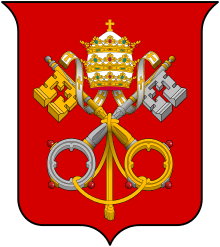Pontifical Academy for Latin
| Latin: Pontificia Academia Latinitatis | |
| Type | Pontifical academy |
|---|---|
| Established | 2012 |
| President | Professor Ivano Dionigi |
| Location | Vatican City |
| Website | |
The Pontifical Academy for Latin (Latin: Pontificia Academia Latinitatis) is the eleventh and newest pontifical academy. Headquartered in the Vatican City, it was established for the promotion and appreciation of the Latin language and culture. The Academy replaces the Latinitas Foundation and is linked to the Pontifical Council for Culture on which it depends.
It was founded on 10 November 2012 by Pope Benedict XVI with the motu proprio Latina Lingua,[1] with a view to preserve and spread knowledge of the different versions of modern and ancient Latin, including and emphasizing, but by no means limited to, ecclesiastical Latin (Church Latin) as used in the liturgies and Masses of the current Roman Missal of the 2011 Mass of Pope Paul VI (the current one, which is usually said in the vernacular language, or local people's language), as well as the Mass of Pope John XXIII (the most recent version of the pre-Vatican II Tridentine Mass, or Latin Mass, the earlier and alternative form).
Professor Ivano Dionigi and Reverend Father Roberto Spataro were on 10 November 2012 named respectively the inaugural president and secretary of the academy.[2]
Aims
- to encourage the knowledge and study of Latin — language and literature, classical and patristic, Medieval and humanistic — in particular at the Catholic institutions for formation at which both seminarians and priests are trained and taught;
- to promote the use of Latin in various contexts, both as a written and as a spoken language.
Activities
To achieve the said aims the Academy intends:
- to publish and to organize meetings, study congresses and exhibitions;
- to set up and support courses, seminars and other training projects in coordination with the Pontifical Institute for Advanced Latin Studies;
- to teach the young generations a knowledge of Latin, also through the modern means of communication;
- to organize exhibitions, shows and competitions;
- to plan other activities and initiatives necessary for attaining the goals of the institution.
Organisation
The Pontifical Academy for Latin consists of the President, the Secretary, the Academic Council and Members, who are also known as Academicians.
The President of the Academy is appointed by the Supreme Pontiff for a five-year term. The office of the President may be extended for a second five-year term. It is the task of the President:
- to represent the Academy legally before any judicial or administrative authority, of either the Church or the State;
- to convoke and to chair the Academic Council and the Assembly of Members;
- to take part as a Member in the meetings of the Coordinating Council of the Pontifical Academies and to maintain relations with the Pontifical Council for Culture.
- supervise the Academy’s work
- take care of the ordinary administration with the assistance of the Secretary, and in matters of extraordinary administration with the advice of the Academic Council and of the Pontifical Council for Culture.
The Secretary is appointed by the Supreme Pontiff for a five-year term and may be extended for a second five-year term. The President delegates the Secretary to replace him in the case of absence or impediment.
The Academic Council consists of the President, the Secretary and five Councillors. The Councillors are elected by the Assembly of Academics for a five-year term that may be extended.
The Academic Council, which is chaired by the President of the Academy, deliberates on the more important matters that concern the Academy. It approves the agenda in view of the Assembly of Members that is to be held at least once a year. The Council is convoked by the President at least once a year and, in addition, whenever it is requested by at least three Councillors.
The President, with the consent of the Council, may appoint an Archivist, with the duties of librarian, and a Treasurer.
Members
The Academy consists of no more than 50 Ordinary Members known as Academicians, who are scholars and connoisseurs of Latin, language and literature. They are appointed by the Secretary of State. When they reach the age of 80, the Ordinary Members become “emeritus”.
Ordinary Academicians take part in the Assembly of the Academy convoked by the President. Academicians emeritus may take part in the Assembly but are not entitled to vote.
The President of the Academy, having heard the opinion of the Council, may appoint as well as Ordinary Academicians other Members, known as Correspondents.
See also
- Global organisation of the Catholic Church
- Index of Vatican City-related articles
- Latinitas Foundation
References
- ↑ Benedict XVI, Motu Proprio Latina Lingua in English; accessed 6-11-2013
- ↑ "Daily Bulletin". Retrieved 4 January 2014.
External links
- Apostolic letter in the form of "motu proprio" and the statutes
- Official website
- Pontifical Academies - Website of the Holy See

